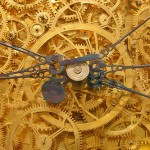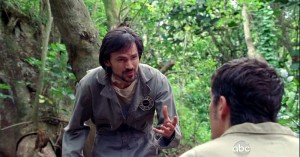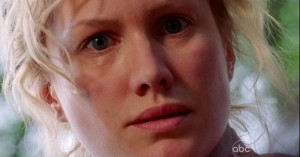Lost In Myth: “The Variable”—Choosing to Sacrifice For the Sake of the Island
 At the end of my last column, I asked whether the “variable” would prove to be an event that could change everything. The one thing that could have a domino effect on the outcomes of every event that followed. I wondered if this changeable event is what Ben and Widmore have been fighting for control of. After watching “The Variable,” I have to say “yes,” this is what the term is referring to. However, I’m still not so sure whether the variable will actually vary anything according to the mythology of the show.
At the end of my last column, I asked whether the “variable” would prove to be an event that could change everything. The one thing that could have a domino effect on the outcomes of every event that followed. I wondered if this changeable event is what Ben and Widmore have been fighting for control of. After watching “The Variable,” I have to say “yes,” this is what the term is referring to. However, I’m still not so sure whether the variable will actually vary anything according to the mythology of the show.
For diehard Lost fans, “The Variable” didn’t really offer anything we didn’t already know or suspect. Eloise Hawking admits to being Daniel’s mum. Okay, we knew that. Charles Widmore claims to be Daniel’s father. Okay, most of us suspected that. Daniel reveals that the young Other named Ellie who he’d met on the island in the 1950s is, in fact, his mother Eloise. Yeah, we were all pretty much taking that one for granted. The mystery that wasn’t answered however, is how the strapping and attractive Widmore and blonde-haired, blue-eyed Hawking produced a scraggly, dark-haired, goofy guy named Faraday?
Even if we suspend disbelief for the casting mismatch, where the heck did the name come from? Was Daniel named for Michael Faraday, the British physicist known for his work with electromagnetism? In fact, since Widmore has acknowledged that John Locke was named for a philosopher, does that mean all the characters who share names with famous people were given those names for a reason? We had always assumed that the character names were just little hints of the writers, but now it’s beginning to seem like the reasoning may be more integral to the plot. Are Daniel Faraday, John Locke/Jeremy Bentham, Mikhail Bakunin, Danielle Rousseau, Charlotte Staples Lewis, and the rest just players in some little game? Are they pawns that can be sacrificed for a desired outcome? Or are they variables whose actions can directly affect the outcome of the fate of the world? While Lost is hinting at all three possibilities, from a mythological perspective, it is the latter option that has the most relevance for our real lives.
 The “variable,” as Daniel reveals in this episode, is “us.” Us, as in the viewers—people! “We think, we reason, we make choices, we have free will,” he goes on to say. “We can change our destiny.” Personally, I feel that you can’t have it both ways. If you’re going to view time as a straight line that doesn’t allow for paradoxes and that “whatever happened, happened,” then destiny is set in stone. However, if you look at time as I do—as an infinite number of possibilities and that we “jump” into the one our mind is attracting, then yes, I believe we can change our path. All we have to do is change our mind. While this is admittedly easier said than done, the repercussions either way go way beyond the fate of one person. As Lost shows us, we are all connected. For this reason, the choices we make not only affect our lives but the fate of the entire world.
The “variable,” as Daniel reveals in this episode, is “us.” Us, as in the viewers—people! “We think, we reason, we make choices, we have free will,” he goes on to say. “We can change our destiny.” Personally, I feel that you can’t have it both ways. If you’re going to view time as a straight line that doesn’t allow for paradoxes and that “whatever happened, happened,” then destiny is set in stone. However, if you look at time as I do—as an infinite number of possibilities and that we “jump” into the one our mind is attracting, then yes, I believe we can change our path. All we have to do is change our mind. While this is admittedly easier said than done, the repercussions either way go way beyond the fate of one person. As Lost shows us, we are all connected. For this reason, the choices we make not only affect our lives but the fate of the entire world.
Every single day of our lives, we make choices based upon our personal interpretation of our experiences. Most of the time we make choices to avoid pain and gain pleasure. And usually we make choices that are more likely to benefit us in the short term, than the long term. The reason is that the long-term choices are usually more challenging and less certain than the short term ones. With every variable that life throws at us, we can choose to take the easy path and do what we want, or take the more challenging path and grow ourselves so that we are more likely to succeed at our destiny. Unfortunately, since most of us have taken the easy way out over the last several decades, the result is the rather crappy scenario we must all deal with right now.
Think of each person on the planet as a gear in a huge universal clock. If just one gear doesn’t do its job, it messes up the entire mechanism. Conversely, the more gears that grow themselves, the easier it will be to get the mechanism to flow smoothly. Viewed from this perspective, every single life is important in effecting the fate of the world. And the more people that know this, the quicker we can make a difference. The more people who step up and challenge themselves, the more likely we will benefit as a society. And will all those who step up be personally rewarded? Not in the material sense. These challenges will require sacrifice.
 As a young child, Faraday wanted to play music, but his mother insisted that his gift was science and that this was the path to his destiny. So, Faraday gave up music for physics which has seemingly resulted in his death—death at the hands of his mother. Why would his own mother, who was apparently aware of this tragic outcome, point him directly towards it? She must believe that Daniel’s sacrifice is for a much greater good. That his death was not in vain. That he sacrificed his love of music, his romantic relationships, his mind, and ultimately his life for a reason.
As a young child, Faraday wanted to play music, but his mother insisted that his gift was science and that this was the path to his destiny. So, Faraday gave up music for physics which has seemingly resulted in his death—death at the hands of his mother. Why would his own mother, who was apparently aware of this tragic outcome, point him directly towards it? She must believe that Daniel’s sacrifice is for a much greater good. That his death was not in vain. That he sacrificed his love of music, his romantic relationships, his mind, and ultimately his life for a reason.
Mythologically speaking, the cherubic Ms. Hawking represents our guardian angel or fairy godmother. She is our gut instinct that guides us on our path for better or worse. It remains to be seen why Daniel’s scientific contributions were so important to the fate of the world that they were seen as more important than his own life. I do not believe that the message here is that we are all doomed, or that all our work will be for nothing. Instead, the message seems to be that we are all going to have to make sacrifices if we want our world to move forward.
Right now, almost all of us are being forced to make sacrifices because we haven’t volunteered to make enough on our own accord. Many of us have been greedy but because of the recent economic downfall we now must learn to be more fiscally responsible and less materialistic. Many of us have inadvertently abused our planet but because of severe climate change, we now must reduce our dependence on fossil fuels and move towards renewable sources of energy. Had we stepped up to these challenges in the sixties and seventies when they were first presented to us, we wouldn’t be in this predicament right now. If only we had chosen mutual respect and spirituality over the excesses of the “me” generation, what kind of world would we live in now? What if we could go back in time and prevent the assassination of Martin Luther King or Robert Kennedy? Or somehow convince the world to change? Could we affect the outcome, or would the world have simply course corrected because it was our fate to learn the hard way?
Regardless of whether or not we could change the past, because we were selfish in recent times, now, we must pay. Since so many gears in our universal clock didn’t grow themselves, it’s now going to take much more effort from all of us to get this clock ticking properly again. The lesson we’ve all hopefully learned is that when given a choice in life, we should choose the more challenging path—the one that will enable us to grow. We should be proactive, make sacrifices, and choose to take a leap of faith because if we don’t, the universe will choose for us. It’s the sacrifice “the island” demands.
While I believe that we do have control over the outcome of our lives and, through our connections, the path of the world, I’m not sure yet if Lost is on the same wavelength. It seems to me that this variable is what Ben and Widmore are fighting about. Is Ben one of the good guys? Is Bram on the team that’s going to win? Does the island “course correct” to ensure a certain fate? If the variable can be changed, Lost’s message is that any one of us can affect the fate of the world. However, if it turns out that whatever happened, happened and dead is dead, the message is that we’re all just pawns in some big, and probably sick, game. Since I also believe that the media channels real messages and Lost in particular has tapped into some pretty big truths, it isn’t just the fate of Lost’s characters that will be decided in the season’s final episodes. It’s ours. Can we as humans change the path that the world is going? Do we have any say in our ultimate destiny? Tune in to Lost to find out.
Marc Oromaner is a New York City writer whose new book, The Myth of Lost offers a simple solution to Lost and how it provides hidden insight into the mysteries of life. He can be contacted in the discussion section of The Myth of Lost Facebook page.
The Myth of Lost is available on Amazon and barnesandnoble.com.


